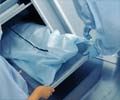The National Academy of Sciences report has called for a wholesale overhaul of the crime lab system, which has become increasingly crucial to American jurisprudence.
The academy, a key advisor to the federal government, found the system in disarray: labs that are under-funded and beholden to law enforcement and that lack independent oversight and consistent standards. The report concludes that the deficiencies pose "a continuing and serious threat to the quality and credibility of forensic science practice," imperiling efforts to protect society from criminals and shield innocent people from convictions.With the notable exception of DNA evidence, the report says that many forensic methods have never been shown to consistently and reliably connect crime scene evidence to specific people or sources.
"The simple reality is that the interpretation of forensic evidence is not always based on scientific studies to determine its validity," the report says.
For example, frequent claims that fingerprint analysis had a zero error rate are "not scientifically plausible," the report said. The scientific basis for bite mark evidence is called "insufficient to conclude that bite mark comparisons can result in a conclusive match."
Although the panel's recommendations are not binding, they are expected to be influential. Among the recommendations:
* Create a new federal agency, the National Institute of Forensic Science, to fund scientific research and disseminate basic standards.
Advertisement
* Require that expert witnesses and forensic analysts be certified by the new agency, and that labs be accredited.
Advertisement
Said U.S. Court of Appeals Judge Harry Edwards, co-chairman of the panel: "There are a lot of people who are concerned, and they should be concerned. Forensic science is the handmaiden of the legal system. . . . If you claim to be science, you ought to put yourself to the test."
Peter Neufeld, Co-Director of the Innocence Project, said, “This unprecedented report shows that many forensic techniques which are relied on in courtrooms every day lack scientific support. This report is a major breakthrough toward ensuring that so-called scientific evidence in criminal cases is solid, validated and reliable…For too long, forensic science professionals have not had the support or management needed to identify the real strengths and weaknesses of different assays and techniques. This report provides the roadmap for rectifying that problem, and we look forward to working with Congress and other key stakeholders to implement the report’s recommendations.”
The Innocence Project is a national litigation and public policy organization dedicated to exonerating wrongfully convicted people through DNA testing and reforming the criminal justice system to prevent future injustice.
In one of more than 100 such cases nationwide, Innocence Project client Roy Brown was convicted of murder near Syracuse, New York. His conviction was based largely on evidence from the prosecution’s forensic dentist that bite marks on the victim’s body were “entirely consistent” with Brown’s teeth. Brown served 15 years in prison before DNA testing on the saliva from those bite marks proved his innocence – and identified the actual perpetrator of the crime – in 2007. “I can still remember looking at the jury in my trial when they heard the scientist testify. That’s when I knew it was all over and I was going to prison, probably for the rest of my life. Junk science sent me to prison, but real science proved my innocence,” Brown said. “We have to make sure that this doesn’t keep happening to other people, that our system relies on solid science. I hope this report can lead to real change.” Bite mark analysis is not rooted in science and was singled out in the NAS commission’s hearings as one of the disciplines that should not be relied on without substantial research showing its validity or reliability.
To date, 232 people nationwide have been exonerated through post-conviction DNA testing. In approximately half of those cases, unvalidated or improper forensic science contributed to the wrongful conviction, according to the Innocence Project.
The report had harsh words for the FBI Laboratory and the National Institute of Justice, the research arm of the Justice Department, which have shown little enthusiasm for exploring the shortcomings of forensic science.
"Neither agency has recognized, let alone articulated, a need for change," the report states, adding that they could be subject to pro-prosecution biases.
Michael Bromwich, former Inspector General of the U.S. Department of Justice, who has conducted detailed reviews of two forensic science labs, including the FBI Lab, said:
"These recommendations will be extraordinarily important in shaping the future direction of forensic science in this country. For too long, the work of forensic labs has been neglected and the science practiced in some of these labs has lacked the rigor and professionalism that are critical to ensuring fair and just results in our criminal justice system. If properly implemented, these recommendations will lead to greater investments in forensic science and in forensic labs, including in the training and certification of forensic scientists. In turn, this will lead to a higher quality of justice."
While leading associations of forensic scientists hailed the report, defense attorneys, scientists and law professors predictably felt vindicated, as it were.
Prosecutors on the front lines, however, were more skeptical. "I know the defense is probably starting bonfires, but this should not in any way shake up anyone's confidence in forensics," said Paula Wulff, manager and senior attorney of the DNA Forensic Program of the National District Attorneys Assn.
She called the recommendations a "Cadillac of aspirations," and expressed doubt that they would be followed given the poor state of the economy.
All sides, however, agreed that the report signals an aggressive re-entry of scientists into issues that for decades have fallen to lawyers, judges and juries to resolve, wrote Jason Felch and Maura Dolan in Los Angeles Times.
Source-Medindia
GPL/L








